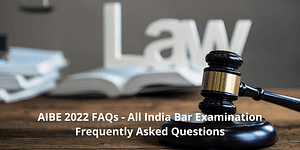LLB Course Admissions 2024
LLB Admission Overview
Bachelor of Laws (LLB) courses involve a rigorous and comprehensive educational journey focused on legal studies. To gain admission to an LLB program, students typically need to have completed their higher secondary education (12th grade) from a recognized board or its equivalent. Admissions are primarily merit-based for 3-year LLB programs, and students often have to clear entrance exams such as CLAT (Common Law Admission Test), AILET (All India Law Entrance Test), or other state-specific exams conducted by universities or colleges for 5-year LLB courses.
The three-year LLB course is available for students who have completed their undergraduate studies in any discipline. Simultaneously, integrated programs like BA LLB, BBA LLB, or BCom LLB spanning five years are also popular choices for students straight out of class 12th with a minimum aggregate marks of 50% or above.
Once admitted, the LLB curriculum covers various aspects of law, including constitutional law, criminal law, administrative law, and more, while emphasising legal theory, practical case studies, and internships to provide a well-rounded legal education. Admission criteria may differ among institutions, but a passion for justice, strong analytical skills, and dedication are fundamental traits for aspiring law students.
Table of Contents
- LLB Admission Overview
- LLB Admission Highlights
- LLB Eligibility Criteria
- LLB Course Fees
- LLB Course Specialisations
- LLB Entrance Exams
- LLB Entrance Exam Quick Preparation Tips
- LLB Selection Process
- How to Apply for a LLB Course?
- Documents Required for LLB Course Admissions
- FAQs about Bachelor of Law Admission Process
LLB Admission Highlights
Here's a table highlighting all the crucial aspects of LLB admissions in India:
Particulars | Details |
|---|---|
| Eligibility Criteria | Completion of higher secondary education (12th grade) or its equivalent from a recognized board with a minimum aggregate marks of 50% or above. |
| Entrance Exams | Common Law Admission Test (CLAT), All India Law Entrance Test (AILET), and state-specific university exams. |
| Courses Available | Three-year LLB program for graduates or integrated courses (BA LLB, BBA LLB, BCom LLB) spanning five years. |
| Admission Process | Merit-based selection through entrance exam scores, followed by counselling and sometimes, personal interviews. |
| Subjects Covered | Constitutional law, criminal law, administrative law, legal theory, case studies, and internships. |
| Essential Skills | Strong analytical skills, critical thinking, passion for justice, and dedication to legal studies. |
| Internships | Emphasis on practical experience through internships in law firms, courts, or legal organisations. |
| Application Timeline | Entrance exams are typically conducted in the first half of the year for 3-year LLB, followed by admissions in the latter half of the year (December) for 5-year LLB courses. |
| Diversity in Programs | Various specialisation options available such as Corporate Law, Intellectual Property Law, and Human Rights. |
| Financial Aid | Some institutions offer scholarships or financial aid based on merit or need for eligible students. |
LLB Eligibility Criteria
Here are the eligibility criteria for both 3-year LLB and 5-year integrated LLB programs in India:
3-Year LLB Eligibility Criteria:
- Educational Qualification: Candidates must have completed their undergraduate degree in any discipline from a recognized university or institution.
- Minimum Marks: Most law schools require a minimum aggregate score in the undergraduate program, typically around 45-50%. However, this may vary by institution.
- Age Limit: There is usually no specific age limit for admission to the 3-year LLB program.
- Entrance Exams: Some universities or colleges may conduct their entrance exams for admission, while others may admit students based on their undergraduate exam scores.
5-Year Integrated LLB Eligibility Criteria:
- Educational Qualification: Candidates should have completed their higher secondary education (10+2) from a recognized board or its equivalent.
- Minimum Marks: The minimum aggregate marks required in the 10+2 examination typically range from 45% to 50%, depending on the institution and the category of the candidate.
- Age Limit: There is usually no specific age limit for admission to the 5-year integrated LLB program.
- Entrance Exams: Admission to most integrated LLB programs is based on performance in national-level entrance exams like CLAT (Common Law Admission Test) or state-specific law entrance tests. Students are selected based on their entrance exam scores and may go through a counselling process for seat allotment.
It's cardinal to note that eligibility criteria may vary slightly among different universities and colleges, so applicants should verify specific requirements with the institution they are interested in applying to.
LLB Course Fees
LLB course fees in India can vary significantly depending on the university or college, location, and reputation of the institution. Below, I'll provide a general range of course fees for both 3-year and 5-year LLB programs:
3-Year LLB Course Fees:
Government or public universities: The fees for a 3-year LLB program in government institutions can range from approximately Rs. 10,000 to Rs. 50,000 for the entire course.
Private universities or colleges: For private institutions, the course fees for a 3-year LLB program can vary widely. They may range from Rs. 1,00,000 to Rs. 3,00,000 or more for the full length of the course.
5-Year Integrated LLB Course Fees:
Government or public universities: Integrated LLB programs in government institutions are generally more affordable. The fees typically range from Rs. 20,000 to Rs. 1,00,000 for the entire 5-year program.
Private universities or colleges: Private institutions offering 5-year integrated LLB programs may charge higher fees. These fees can range from Rs. 2,00,000 to Rs. 5,00,000 or more for the complete course.
Please be aware that the numbers given are approximations and may change depending on a number of variables, including the particular university, where it is located, and whether it is a public or private institution. Scholarships, financial aid, and reserved seats for particular groups can also affect a student's actual cost of attendance. For the most precise and current information on LLB course prices, it is advised to speak with the institutions directly.
LLB Course Specialisations
Here are some LLB course specialisations offered in India:
Criminal Law: Criminal law specialisation focuses on the study of criminal offences, legal procedures, and the criminal justice system. Graduates often become criminal defence lawyers, public prosecutors, or legal advisors in law enforcement agencies.
Constitutional Law: Constitutional law deals with the Indian Constitution, its interpretation, and constitutional principles. Graduates in this specialisation often work as constitutional lawyers, legal advisors, or human rights activists.
Corporate Law: Corporate law is about legal aspects of businesses, including corporate governance, mergers and acquisitions, and company compliance. Graduates can work as corporate lawyers, legal consultants, or in-house counsel for companies.
Intellectual Property Law: This specialisation covers patents, trademarks, copyrights, and other intellectual property rights. Graduates often become intellectual property lawyers, patent examiners, or legal advisors for creative industries.
Family Law: Family law focuses on legal matters related to marriage, divorce, child custody, and inheritance. Graduates may work as family lawyers, divorce mediators, or legal advisors in family courts.
Environmental Law: Environmental law deals with legal issues concerning environmental protection and sustainability. Graduates can work as environmental lawyers, legal consultants for environmental agencies, or environmental policy advocates.
Human Rights Law: Human rights law focuses on the protection and promotion of human rights and civil liberties. Graduates often work with non-governmental organisations, international bodies, or as human rights lawyers.
Labour and Employment Law: Labour and employment law covers employment contracts, labour disputes, and workplace regulations. Graduates may become labour lawyers, HR legal advisors, or employment law consultants.
Taxation Law: Taxation law deals with taxation regulations, tax planning, and resolving tax-related disputes. Graduates often work as tax lawyers, tax consultants, or in taxation departments of corporations.
International Law: International law focuses on legal issues between nations and international organisations. Graduates may work as international lawyers, diplomats, or legal advisors for foreign affairs departments.
These are just a few examples of the many specialisations available to LLB students in India. Based on their interests and professional aspirations, students might select a specialisation.
Note: In many 3-year LLB programs, the curriculum is generally more generalised, covering core legal subjects without a specific focus on specialisations. Students may receive a broad understanding of various aspects of law, such as criminal law, contract law, constitutional law, and more.
Specialisations are often more common in 5-year integrated LLB programs or postgraduate law degrees like LLM (Master of Laws). These programs allow students to delve deeper into specific areas of law, including those mentioned in the previous response, such as criminal law, constitutional law, corporate law, intellectual property law, and so on.
If a student is interested in pursuing a particular specialisation, they may need to consider a 5-year integrated LLB program or explore postgraduate options like LLM to gain expertise in a specific area of law.
LLB Entrance Exams
In India, there are several entrance exams for admission to LLB (Bachelor of Laws) programs at various universities and law schools. Some of the prominent LLB entrance exams in India include:
Common Law Admission Test (CLAT): CLAT is one of the most popular national-level entrance exams for admission to undergraduate and postgraduate law programs in India. It is conducted on a rotational basis by 22 participating National Law Universities (NLUs).
All India Law Entrance Test (AILET): AILET is conducted by the National Law University, Delhi, for admission to its five-year integrated BA LLB (Hons) program.
Maharashtra Common Entrance Test for Law (MH CET Law): This exam is conducted for admission to law programs in Maharashtra, including three-year LLB and five-year integrated LLB courses.
Delhi University LLB Entrance Exam (now through CUET): The University of Delhi conducts an entrance exam for admission to its three-year LLB program.
BVP CET Law: Bharati Vidyapeeth Deemed University conducts the BVP CET Law for admission to its law courses, including LLB.
TS LAWCET: Telangana State Law Common Entrance Test is conducted for admission to law programs in Telangana, including three-year LLB and five-year integrated LLB courses.
Karnataka Common Entrance Test (KCET): KCET is conducted for admission to law programs in Karnataka, including three-year LLB and five-year integrated LLB courses.
LSAT India: The Law School Admission Test (LSAT) is used by some universities and law colleges for admission to their law programs.
Aspiring law students must be aware of the particular entry tests needed for the schools and programmes in which they are interested. Candidates should prepare for the possibility that each exam will have unique qualifying requirements, a different material, and a different structure. Furthermore, there may be variations in the dates and application procedures for these examinations, so candidates should keep in contact with the relevant exam authorities.
LLB Entrance Exams Schedule
The schedule for top LLB entrance exams in India are as follows:
| Entrance Exam | Exam Date |
|---|---|
| CLAT 2024 | December 3, 2023 |
| AILET 2024 | December 10, 2023 |
| MH CET Law | MH LLB (3 Years): March 11 - 13, 2024 MH LLB (5 Year): May 7 - 8, 2024 |
| TS LAWCET | May 2024 (tentative) |
| AP LAWCET | May 2024 (tentative) |
| SLAT | May 2024 (tentative) |
| LSAT India 2024 | January 20, 2024 till May 19, 2024 |
| CUET UG and CUET PG | CUET UG: March 11, 2024 to March 28, 2024 CUET PG: May 15, 2024 till May 31, 2024 |
LLB Entrance Exams Syllabus
The syllabus for LLB entrance exams in India can vary depending on the specific exam and university. However, I can provide a general overview of the topics commonly included in the syllabus for both 3-year LLB and 5-year integrated LLB entrance exams:
3-Year LLB Entrance Exam Syllabus:
General Knowledge and Current Affairs: Questions related to current events, national and international affairs, and general knowledge.
English Language: Topics include reading comprehension, vocabulary, grammar, and language skills.
Legal Aptitude: This section assesses your understanding of the law, legal principles, and reasoning abilities. It may include questions on legal maxims, fundamental rights, and legal reasoning.
Logical Reasoning: Questions on logical and critical reasoning to test analytical skills.
Elementary Mathematics: Basic mathematics topics, including arithmetic, algebra, and geometry, may be included in some exams.
Constitutional Law: Basics of the Indian Constitution, its features, fundamental rights, and directive principles of state policy.
5-Year LLB Entrance Exams Syllabus
The syllabus for 5-year integrated LLB entrance exams in India can vary slightly depending on the specific exam and the institution conducting it. However, the following is a general overview of the topics commonly covered in these exams:
General Knowledge and Current Affairs:
Current events and news of national and international significance
Political and economic developments
Awards and honours.
Sports and entertainment
Important dates and events
English Language:
Vocabulary
Grammar and comprehension
Reading comprehension
Synonyms and antonyms
Idioms and phrases
Legal Aptitude and Legal Reasoning:
Legal propositions and principles
Syllogisms
Legal maxims
Contracts and constitutional law
Torts and criminal law
Logical Reasoning:
Analytical reasoning
Critical reasoning
Number series
Letter series
Blood relations
Mathematics:
Elementary mathematics
Profit and loss
Time and work
Speed and distance
Data interpretation and charts
Social Sciences:
History, geography, and civics
Fundamental rights and duties
Constitution of India
Legal systems around the world
It's crucial to remember that each admission exam may have a different syllabus and weighting for each component. For precise information, updates, and any modifications to the curriculum, applicants should consult the official exam notices and websites of the organisations holding these exams. Mock tests and practise papers specifically created for these assessments can also aid applicants in their effective preparation.
LLB Entrance Exam Quick Preparation Tips
Here are some unique preparation tips for both 3-year LLB and 5-year integrated LLB entrance exams:
For 3-Year LLB Entrance Exams:
Understand the Syllabus: Familiarise yourself with the specific syllabus of the 3-year LLB entrance exam you are preparing for. Concentrate your attention on the pertinent topics and subjects.
Previous Year Papers: Review previous year's question papers to get an idea of the exam pattern and types of questions commonly asked. Try your timed problem-solving skills through mock/ sample papers available online/ offline.
Legal Vocabulary: Develop a strong legal vocabulary. Understand legal terms, maxims, and principles commonly used in the field of law. This will be valuable for both the entrance exam and future studies.
Read Legal Literature: Read legal literature, landmark cases, and constitutional provisions. This will not only enhance your legal knowledge but also improve your understanding of legal reasoning and arguments.
Legal News and Updates: Stay updated with current legal news and landmark judgments. Many law entrance exams include questions related to recent legal developments.
For 5-Year LLB Entrance Exams:
Here are some quick and unique preparation tips to excel in 5-year LLB entrance exams:
Understand the Exam Pattern: Each entrance exam may have a slightly different pattern, including the number of questions, marking scheme, and time constraints. Understanding these nuances will help you strategize your preparation accordingly.
Legal News and Updates: Stay updated with current legal news and developments in India and around the world. This will not only boost your general knowledge but also enhance your legal aptitude.
Regular Mock Tests: To evaluate your readiness, take practice exams frequently. Examine your performance, pinpoint your areas of weakness, and make improvements. It's an effective way to get a real feel for the exam.
Legal Writing Practice: Legal reasoning and legal aptitude questions often require precise and logical writing. Practice writing concise and coherent answers to legal scenarios and questions. This will help you express your thoughts effectively during the exam.
Group Discussions and Debates: Engage in group discussions and debates on legal topics. This will improve your analytical and argumentative skills, which are essential for law entrance exams.
Legal Terminology Mastery: Learn and understand the key legal terminologies and Latin phrases commonly used in the field. This will not only enhance your legal reasoning but also help you in legal maxims and legal principles questions.
Study Legal Landmarks: Familiarise yourself with landmark legal cases, judgments, and their implications. These often come up in legal aptitude sections and can set you apart from other candidates.
Mind Mapping Techniques: Use mind mapping techniques to organise legal concepts and principles visually. This can make complex legal topics easier to understand and remember.
Time Management: Develop effective time management skills. Create a study schedule that includes regular breaks to avoid burnout and maintain focus during your preparation.
Legal Magazines and Journals: Subscribe to legal magazines, journals, and online resources to gain in-depth knowledge of legal issues and perspectives. This can be valuable for both legal reasoning and general knowledge sections.
Seek Guidance: If possible, seek guidance from law professionals, legal faculty, or senior law students. They can provide insights, tips, and mentorship to help you prepare effectively.
Recall that the secret to succeeding in the 5-year LLB entrance exams is focused and persistent preparation. To do your best on test day, keep practising, maintain your confidence, and modify your study strategies as necessary.
LLB Selection Process
The selection process for LLB (Bachelor of Laws) programs in India typically follows a standardised procedure, although specific details may vary among institutions. Here's an overview of the common selection process:
Eligibility Criteria: To be considered for LLB admission, candidates must meet the basic eligibility criteria, which include completing their higher secondary education (12th grade) for the 5-year integrated LLB program or having an undergraduate degree for the 3-year LLB program. Minimum aggregate marks in the qualifying examination may also be required.
Entrance Exams: Many law schools and universities conduct entrance exams for LLB admissions. The most well-known national-level entrance exam is the Common Law Admission Test (CLAT). Other institutions may have their own entrance tests, such as the All India Law Entrance Test (AILET) for NLU Delhi. Candidates must register for and appear in these entrance exams.
Score Assessment: Admission to LLB programs is primarily based on the scores obtained in the entrance exams. The exam scores are used to rank candidates, and those with higher scores are given preference during the selection process.
Counselling or Merit Lists: After the entrance exams, institutions may conduct counselling sessions or release merit lists, depending on the ranking of candidates. Based on their ranks, candidates are allotted seats in the LLB program of their choice.
Personal Interviews: In some cases, institutions may conduct personal interviews as part of the selection process, especially for certain specialised or premium law schools. These interviews aim to assess the candidate's communication skills, legal knowledge, and suitability for the program.
Reservation Quotas: Indian law schools often follow reservation quotas for students from specific categories, including Scheduled Castes (SC), Scheduled Tribes (ST), Other Backward Classes (OBC), and Economically Weaker Sections (EWS). A percentage of seats are reserved for these categories, and candidates from these groups may have lower qualifying score requirements.
Final Admission: After the completion of the selection process, successful candidates receive admission offers. They are required to fulfil the necessary documentation, including educational certificates, identity proofs, and application fees, to secure their seats.
It's essential to remember that different Indian institutions and legal schools may have distinct specifics and methods. As a result, applicants should make sure they are familiar with the most recent information on admission requirements and procedures by keeping up with the admission guidelines supplied by the colleges to which they are applying.
How to Apply for a LLB Course?
Applying for an LLB (Bachelor of Laws) course in India typically involves several steps, and the specific application process can vary by institution. Here's a general overview of how to apply for an LLB course:
Research and Choose Institutions: Start by researching and identifying the law schools or universities where you want to apply for an LLB program. Take into account elements like the course offers, location, reputation, and entrance requirements.
Check Eligibility: Review the eligibility criteria for the LLB program at your chosen institutions. Make sure you fulfil the academic standards as well as any additional requirements set forth by the organisation.
Entrance Exam Registration: If the institution requires an entrance exam for admission (e.g., CLAT, AILET), register for the relevant exam within the specified deadlines. Pay the exam fee and keep a record of your registration details.
Complete Application Forms: Once you've selected the institutions and registered for the entrance exams, fill out the application forms online/ offline provided by the universities or colleges. This may involve providing personal information, academic details, and exam registration numbers.
Submission of Documents: Gather the necessary documents, including your academic transcripts, certificates, identification proof (e.g., Aadhar card, passport), and any other documents as specified in the application forms. Make photocopies of these documents as required.
Documents Required for LLB Course Admissions
When applying for an LLB (Bachelor of Laws) course in India, you typically need to provide several documents to support your application. The exact requirements may vary by institution, so it's essential to check with the specific law schools or universities where you plan to apply. However, here's a list of common documents that are often required for LLB course admissions:
Academic Transcripts and Certificates:
10th and 12th-grade (or equivalent) mark sheets and certificates.
Bachelor's degree mark sheets and certificates (for 3-year LLB applicants).
Entrance Exam Admit Card: If the institution requires an entrance exam, you need to provide a copy of the admit card showing your registration for the exam.
Entrance Exam Score Card: A copy of the scorecard or rank obtained in the entrance exam, if applicable.
ID Proof: A government-issued authentic photo ID proof like Aadhar card, passport, or driver's licence.
Passport-size Photographs: Recent passport-sized photographs as per the institution's specifications.
Category or Reservation Certificate (if applicable): Candidates belonging to reserved categories, such as Scheduled Castes (SC), Scheduled Tribes (ST), Other Backward Classes (OBC), or Economically Weaker Sections (EWS), may need to provide relevant caste or category certificates.
Domicile Certificate (if applicable): Some state-specific institutions may require a domicile certificate to claim seats reserved for residents of that state.
Transfer Certificate (TC) or Migration Certificate: These certificates may be required to demonstrate that you have formally left your previous institution, especially if you're transferring from another university.
Character Certificate: A character certificate issued by the institution last attended, vouching for your conduct and behaviour.
Gap Certificate (if applicable): If there is a gap between your previous education and the LLB course application, you may be required to provide a gap certificate explaining the reason for the break.
Other Documents: Some institutions may have specific requirements, so it's important to review their application guidelines carefully.
Remember that it's crucial to provide authentic and verifiable documents during the admission process. Keep copies of all submitted documents for your records at all times as well. If you are unsure about the specific requirements for the LLB program you're interested in, contact the admission office of the institution for clarification.
FAQs about Bachelor of Law Admission Process
Can I apply for LLB programs in multiple universities simultaneously?
Yes, you can apply for LLB programs in multiple universities simultaneously in India. Many universities and law schools conduct separate admission processes, and as long as you meet their individual eligibility criteria, you can apply to several institutions to maximise your chances of admission.
What can I do to improve my chances of LLB admission if my undergraduate grades are low?
To improve your chances of LLB admission with low undergraduate grades, focus on excelling in the entrance exam, showcasing your legal aptitude and skills, and highlighting relevant experiences in your application. Strong performance in the entrance exam can compensate for lower grades and demonstrate your commitment to legal studies.
Are there age restrictions for LLB admission?
In most cases, there are no specific maximum age restrictions for LLB (Bachelor of Laws) admissions in India. The main factors determining eligibility are educational background and results on entrance exams. As long as candidates meet the academic requirements and qualify in the entrance exams, they can apply for LLB programs, regardless of their age.
Can I do LLB through distance mode?
No, LLB (Bachelor of Laws) cannot be pursued through distance mode in India. The Bar Council of India (BCI) does not recognize distance education for LLB. To practise law in India, you need to complete an LLB from a recognized institution offering regular, full-time courses.
What is the total time offered to complete a LLB Course?
The total time offered to complete an LLB (Bachelor of Laws) course in India is typically either 3 years for the 3-year LLB program, which is available to graduates, or 5 years for the 5-year integrated LLB program, which is open to students immediately after their 12th-grade education.
Can I get admission in a LLB course after 12th?
Yes, you can get admission in a 5-year integrated LLB course after completing your 12th-grade education. Many law schools and universities in India offer integrated LLB programs for students who have completed their higher secondary education. Admission is typically based on entrance exams and eligibility criteria set by the institutions.
Why is LLB good to pursue?
LLB is a prestigious and versatile degree that opens doors to a wide range of career opportunities in the legal field. It equips individuals with critical thinking, analytical, and communication skills, and offers the potential for a fulfilling career as a lawyer, legal consultant, judge, or in various other legal and non-legal roles.
What is the highest salary for LLB graduates?
The highest salary for LLB graduates can vary widely based on factors such as the employer, specialisation, and location. In India, top law firms, corporate legal departments, and senior legal professionals can earn annual salaries ranging from Rs. 10,00,000 to several crores, making it a lucrative field for those with expertise and experience.
Can I do LLB without any entrance exam?
Yes, it is possible to pursue a 3-year LLB program in India without an entrance exam. Some universities and colleges offer direct admission based on academic qualifications, and entrance exams are not mandatory for these institutions. However, eligibility criteria and admission processes can vary among institutions, so it's advisable to check with the specific university or college for their admission requirements.
What is the minimum percentage of marks required for LLB admission?
The minimum percentage of marks required for LLB admission in India typically varies by institution. Generally, for the 3-year LLB program, candidates should have at least 45% to 50% in their undergraduate degree. For the 5-year integrated LLB program, the minimum aggregate mark requirement for the 12th grade is usually around 45% to 50%. Specific requirements may vary by university or college.
Popular Courses
LLB Colleges in States
LLB Colleges in Cities
LLB Colleges by College Type
- Courses
- Bachelor of Law
- Admission Process


















